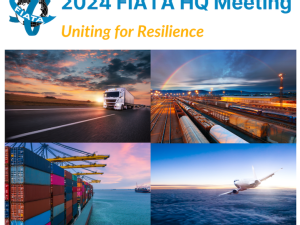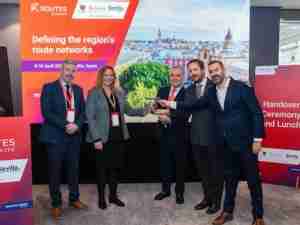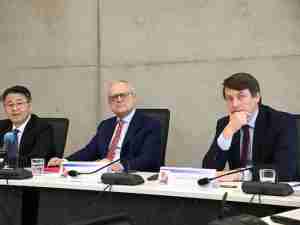'The industry has been brought in at the ground level,' noted Brandon Fried, Executive Director of the Airforwarders' Association, who moderated the discussion. 'We are at the pinnacle of relations between industry and regulatory authorities.'
John Sammon, Assistant Administrator for the Office of Security Policy and Engagement at the Transportation Security Administration (TSA), told the audience of top international air cargo executives: 'We have worked with carriers and forwarders for a long time to get the best combination of procedures, to work out which protocols make sense. We want your knowledge and assistance.'
The panel called for more participants in the Air Cargo Advance Screening pilot programme, an initiative which encourages companies in the industry to exchange advance security filing data by using existing systems and infrastructure to start collecting shipment data at the earliest point in the transportation process.
Mr Sammon added: 'ACAS is the tool and capability to help the world of commerce work intelligently and efficiently. The more people that help us put this together, the more likely we will be to get it right. We need participation while the pilot programme is going on to discover the concerns and find out how to solve them.'
As Kevin McAleenan, Acting Assistant Commissioner for U.S. Customs and Border Protection (CBP) explained: 'We are receiving a lot of information on the air manifest but only four hours before arrival. It's not enough time. We wanted to move it as early as possible and start collecting data early in the system.'
Under the pilot programme so far, only 0.1% of shipments have needed to be examined before loading.
Raymond Benjamin, Secretary General of the International Civil Aviation Organization (ICAO), called for greater industry participation in e-freight. 'I strongly believe that e-freight is a solution, and not just from an economic point of view. We are better off today than we were two years ago and there is a high level of commitment on the part of the vast majority of countries ' but not all. That is where we have to rely on intelligence and risk-based analysis. Our role is to bring everyone together, and that's why I'm here, to speak to the people on the ground. We have to find new ways to identify low risk and high risk.'
The panel recognized the progress the air cargo industry has made. In terms of meeting the TSA's December 2012 deadline for 100% screening of all inbound air cargo into the U.S., John Sammon was confident 'we are going to make it', stating that current screening levels are already in the 'high 90%' and that 56% of air cargo now arrives pre-screened at U.S. airports thanks to the CCSP program.
Karl Ulrich Garnadt, Chairman of the Executive Board and CEO of Lufthansa Cargo, said that there were still some challenges to overcome and that there should be further standardisation. 'Sometimes I feel like it's an uphill struggle,' he said. 'We have good relations with regulators but in some countries there is zero collaboration. We have an interest in standardising regulations. Using shipment data is a big step forward and we are actively supporting that.'
'There's no question that we've drawn closer together,' said Mr McAleenan. 'We are leveraging our joint resources and capabilities. It's a collaborative process.'
The TIACA Air Cargo Forum & Exposition 2012 marked the first time speakers from the TSA, CBP and ICAO have shared a public platform at an air cargo industry event.











